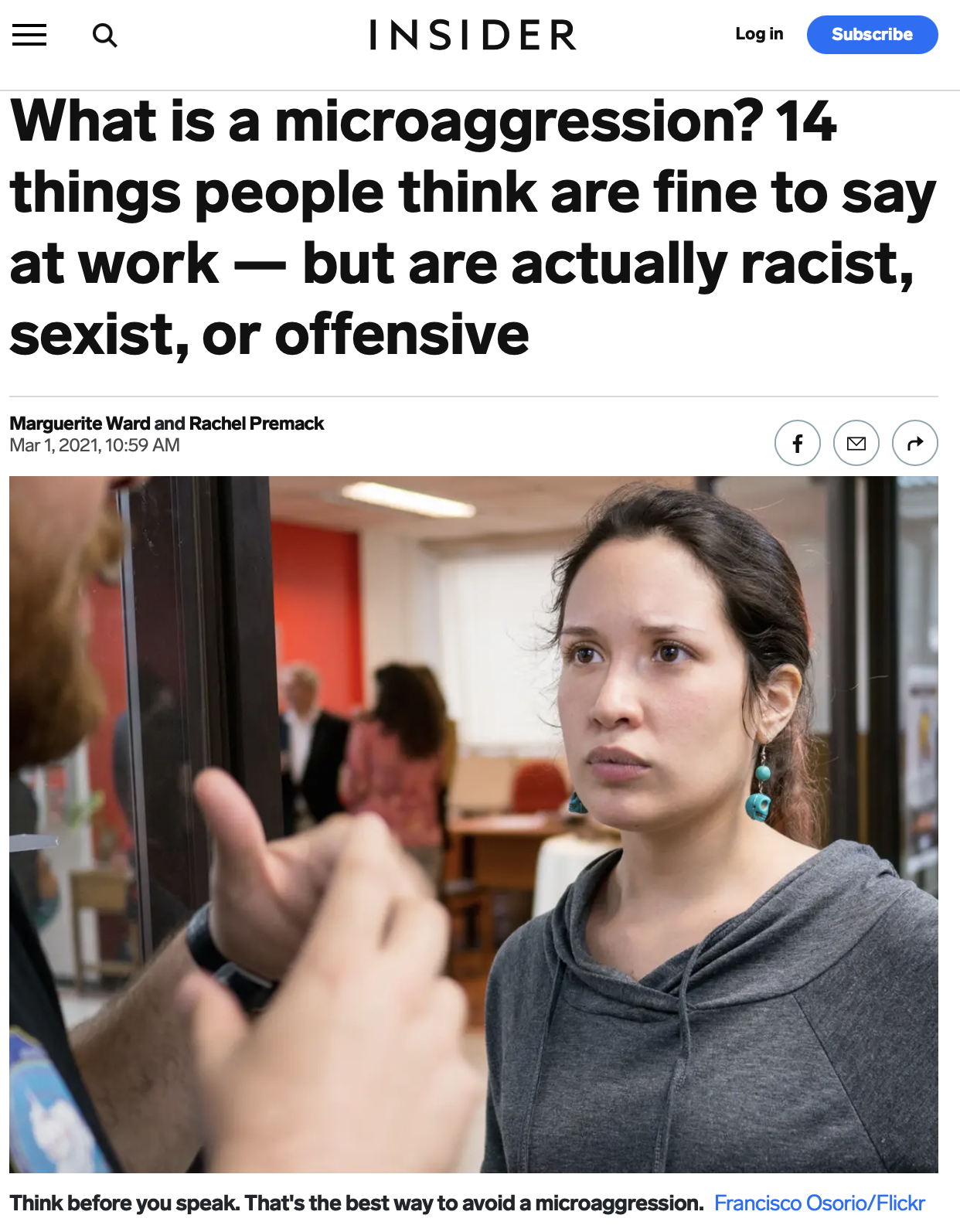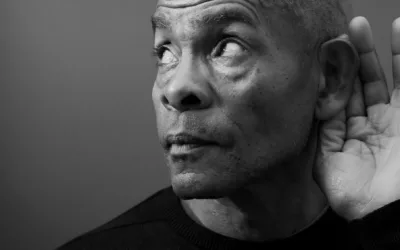
14 things people think are fine to say at work — but are actually racist, sexist, or offensive
A recent article at Business Insider uses recent news from Salesforce to highlight the microaggressions that so many American workers face everyday. “In less than one more, two employees have publicly resigned from Salesforce, citing discrimination and a culture of microaggressions at the company.”
Research shows that a majority of American workers have seen or experienced unintentional expressions or racism, sexism, ableism, ageism, and so many other “isms”. There are many studies that show that most people do not speak up. Why?
Well, there can be many reasons. As we discuss in our course, Disarming Microaggressions, there are a variety of reasons for not speaking up: people don’t want to rock the boat or make the situation worse; they’re afraid of retaliation; confused what was really said; and the most common reason, people don’t know what to say.
This is why Disarming Microaggressions (link to product page) teaches real skills, things each of us can actually say or do to counter a microaggression in the moment or afterwards, without shame or blame. Also, Dr. Sue teaches that the most important thing is to take care of yourself. There may be times when its best not to speak up.
A 2019 survey by Glassdoor of 1,100 US employees found that 61% of US employees had witnessed or experienced workplace discrimination based on age, race, gender, or LGBTQ identity.
In the article, here’s the list of 14 things people say that are actually racist, sexist or offensive. Some of these are microaggressions.
1. ‘You’re so articulate’
2. ‘You’re transgender? Wow, you don’t look like it at all’
3. ‘Oh, sorry, wrong person’
4. ‘Oh, you’re gay? You should meet my friend Ann. She’s gay, too!’
5. ‘My boss is crazy’
6. ‘Where are you actually from?’
7. ‘The way you’ve overcome your disability is so inspiring’
8. ‘Your name is so hard to pronounce’
9. ‘I think you’re in the wrong room — this is the programmers’ meeting’
10. ‘Do you even know what Snapchat is?’
11. ‘Are you an intern? You look so young!’
12. ‘Is that your real hair?’
13. (Interrupting) ‘Well, actually, I think…’
14. ‘Why do you wear that?’
It’s important to understand that each of these comments can sound innocent or even like a good question or compliment. The key is to identify the hidden message and the impact. Dr. Sue teaches strategies of how to directly counter the hidden message and interrupt the microaggressions. In the article, the authors list things you can say. This is an excellent resource and can be useful to prepare in advance for things you hear often. We’ll have much more to say about microaggressions in a subsequent blog. For now, take the Test Drive and learn all about hidden messages in the e-Learning course
More From Our Blog…
Understanding Employee Responses to DEI Initiatives: Insights and Strategies
A recent study sheds light on a previously underexplored aspect of DEI training. While much focus has been placed on the facilitators, trainers and the content of DEI programs, this study examines how employees actually respond to the training. Published in Harvard...
SHRM’s Removal of “Equity” From DEI Framework: A Step Backwards Amid Growing Backlash
In a stunning step in the wrong direction, the Society for Human Resources Management (SHRM), the world’s largest HR association, has removed “Equity” from its “IE&D” framework. What message does this send, especially amid strong pushback against Diversity, Equity...
Navigating the Shifting Landscape of Diversity, Equity and Inclusion Programs
In the midst of the evolving landscape of corporate diversity initiatives, there's a seismic shift underway. The once-prominent acronym "DEI" - representing diversity, equity and inclusion - is notably absent from many company discussions. As explained in the article...
A Groundbreaking New Course: Understanding the Complexity of the Asian American Pacific Islander Experience
With over two decades of experience in the educational sector, Hideko Akashi, founder and lead consultant at Liberation Consulting, has been a steadfast advocate for diversity, privilege, social justice, inclusion and equity. Now, she's opening a new chapter with the...
The Deafening Silence of DEI Allies: A Call to Action in Troubled Times
As we commemorate the legacy of Rev. Dr. Martin Luther King Jr., his poignant words echo through the corridors of history, reminding us of the profound impact of silence in the face of injustice.” In the end, we will remember not the words of our enemies, but the...
DEI LEAP: Empowering Leaders Through Turbulent Times
DEI LEAP: Empowering Leaders Through Turbulent Times As we all know, 2024 has brought a wave of attacks against DEI. A handful of outspoken critics, such as Elon Musk, are misrepresenting DEI and attacking the strategies and practices that are creating more equitable...






